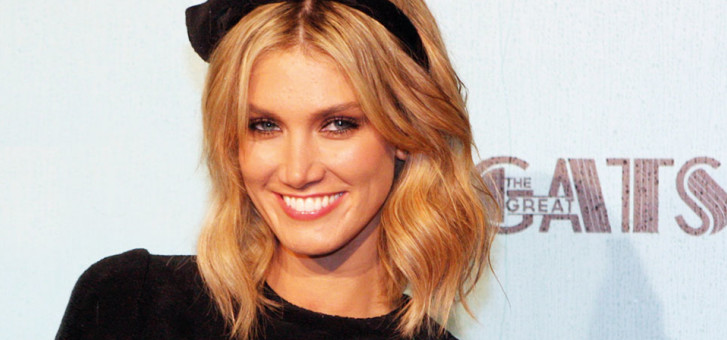As Delta Goodrem wrapped up her “Believe Again” tour of Australia earlier this year, amid the pressures and highlights of her artistic and public life, she seems to have grasped a new sense of perspective.
“Yes, there is a lot of pressure,” she reflects, “but everybody has their own pressures. Every job struggles with balancing time and a life.”
Goodrem is quick to describe music as her “world,” and therein lies her secret. “I think what's most important is to love what you do,” she explains. “I love more than anything to write songs, sing them for people and put on shows. So as long as I am being creative, I'm fine with the rest.
“Keeping perspective is key because I feel there's always more to learn; you can always keep getting better. I continually try to raise the bar and get better for myself and for my fans. At the same time, it's extremely important to have a good support system around you. For me, that includes great friends and family.”
These have been important factors in what has been something of a comeback for Goodrem—at the age of just 24. Her tumultuous early career included two number-one albums after being signed by Sony Music as a 15 year old, a stint on the TV series Neighbours, seven ARIA Music Awards in 2003, her diagnosis and subsequent successful battle with cancer at just 18, and highprofile relationship upheavals.
“Having a number-one album and a number-one single in Australia while in the same week being diagnosed with cancer was extreme,” she reflects, with a snapshot summary of that time. “The time was so intense and I'd just come out of a life-changing experience. It was important to simplify things and come back as a woman—rather than a girl—with music to share and help other people.” She intentionally tried to escape the media spotlight, moving overseas and taking a break from her music career.
“That really was a turning point for me,” says Goodrem. “I knew I could do what I was doing much better than I'd done so far, and the time away was important for me to be with my family, be a young person again, as well as being creatively free. I am different now, in the sense that I've grown and feel much more independent.”
After this time away, she returned to her music, having regained her enthusiasm— if she'd ever lost it—for song writing and performing. “Storytelling is so powerful,” says Goodrem. “For me, voice and sound is the window to your emotions. The feeling I get when I sing, telling a story in song, and seeing people respond, is so rewarding.
“I started writing songs at a young age; I love expressing my inner feelings through music and lyrics. Composing pieces early on and receiving feedback from people made me determined to be focused on music and song writing.
Writing songs, singing and playing music is my life.”
But initially, the challenge of creating new music was daunting. Despite working with some of the best songwriters and producers in the world, Goodrem struggled to re-find her voice. “The turning point came with the album's opening song ‘Believe Again,'” she says.
“Before that, I was feeling a little unsure about the direction of the new album.
That song really turned things around for me in a lot of different ways.”
However, Goodrem says this was less intense that her previous recording experiences. “Working on this album was a very relaxed process, partially due to the fact that I got on so well with everyone who helped out,” she says.
“We had time on our hands to work on material and had a real connection with each other, which allowed me to say exactly what I thought throughout the whole process.
“I know what I want from my music in the studio and I'm not afraid to stand my ground with whoever I'm working with. Every song has to seed from me—the actual seed from where the plant grows has to come from me and my heart, and that's when it's the most honest representation of me.”
The resulting album has this kind of personal touch—as suggested in its title, Delta—but not necessarily in the way some of her fans might assume. “A lot of the words from the songs can be quite deep but that doesn't necessarily mean they're always about my life,” she explains. “There are songs on this album that have nothing to do with my personal experience but are still honest and emotional, and tell a great story.
A lot of people read into my lyrics and think they know me completely from them, but I'm not always as transparent as people might think.”
Perhaps any lack of transparency at this stage in her career reflects Goodrem's experience of being burned in previous chapters of public life. Certainly, her other significant formative experience—as a cancer survivor— impacted her priorities profoundly.
Since her own experience with Hodgkin's lymphoma, Goodrem has been involved in a variety of roles with cancer charities, as well as reassessing her life in practical ways. “It's hard to explain without expanding on too many levels about how it changed me,”
she says. “I was 18 years old, so it was a very impressionable time in my life and it set a lot of foundations that have stayed with me to this day.
“For one thing, my priorities include listening to my body. It's easy to ignore our bodies when we need to do things for work or family but, ultimately, our health needs to be the number-one priority.
I've found that I need to listen to what my body tells me.”
Her recipe for healthful living goes like this: “Live a healthy lifestyle, drink a lot of water and exercise, nourishing your mind, body and soul. Find things that make you happy as a person, then complement that with plenty of sleep so your body can recuperate.”
Among the many roles Goodrem sees she can play in her life, she says, “encouraging a healthy lifestyle and giving positive messages to the world is extremely important.”
And for Goodrem, her music is an integral part of that. “I have short- and long-term goals for my musical career,” she says. “For me, I pace myself, work hard and am disciplined in areas that work for me. Things may not be the exact way you imagined but in this business, that's the exciting part.”






